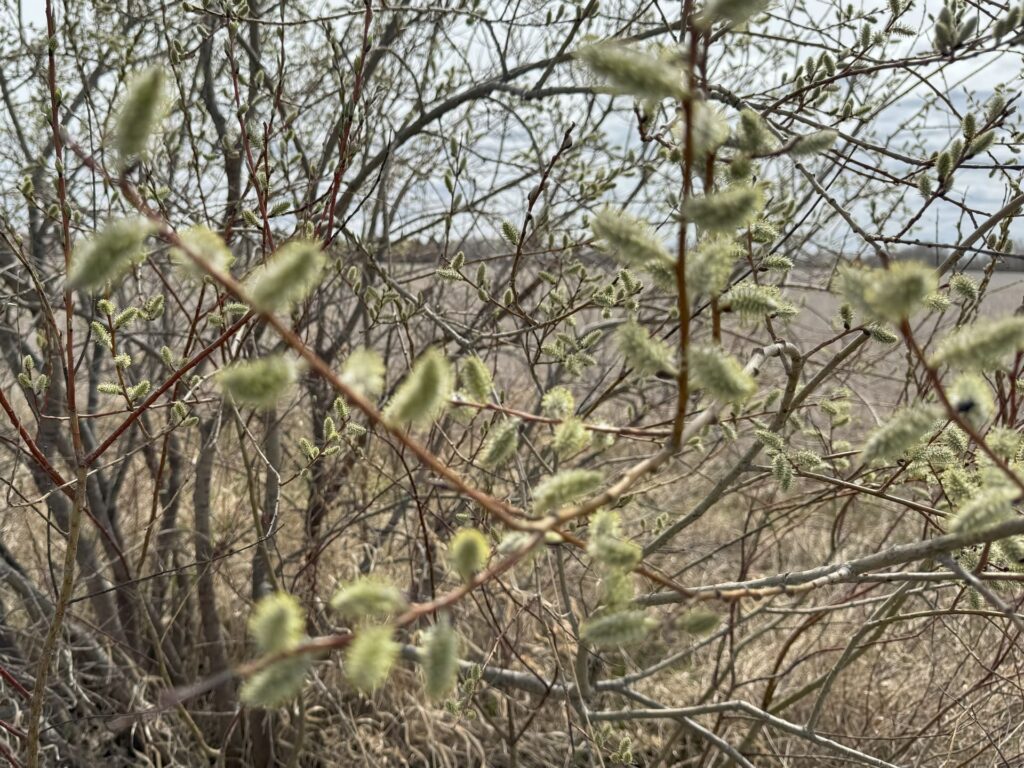
Does Eating Local Honey Reduce Symptoms of Seasonal Allergies?
Maybe it’s because I’m in the honey business so am exposed to a lot of honey marketing, but it seems like almost everybody thinks that eating local raw, unfiltered honey can improve symptoms of seasonal allergies, or “hay fever”. This idea comes up so often on the internet (mostly in honey marketing) and in discussions of raw honey and health, that I’m going to take a deep dive into it in this post.
No time to read a long-form post? Skip to the clincher
I have an allergy to honeybee stings. A serious allergy: anaphylaxis, diagnosed when I was six years old. A potentially life-threatening allergy to honeybee stings is not optimal when you live on a honey farm. I undertook a months-long desensitization treatment pioneered by the allergy specialists at the Mayo clinic, in which I was injected weekly with increasing amounts of honeybee venom (while being closely monitored in a hospital setting) until I had been sufficiently desensitized that I could tolerate the venom of a full bee sting without having a potentially life-threatening anaphylactic reaction. This kind of allergy desensitization treatment where allergic individuals are exposed to small amounts of the allergen repeatedly over time to gradually decrease their immune system’s inappropriate response (the allergic reaction) has become a common treatment of allergies.
Apply the same logic to hay fever and local raw honey: Seasonal allergies are often allergies to certain airborne pollens. Bees collect pollen and pollen is present in natural, unfiltered raw honey (but not processed honey). It’s logical to conclude that by eating local honey (containing local pollen), you’ll be desensitizing yourself to the pollens that cause your seasonal allergies and therefore ameliorating your hay fever symptoms.
I asked Google:
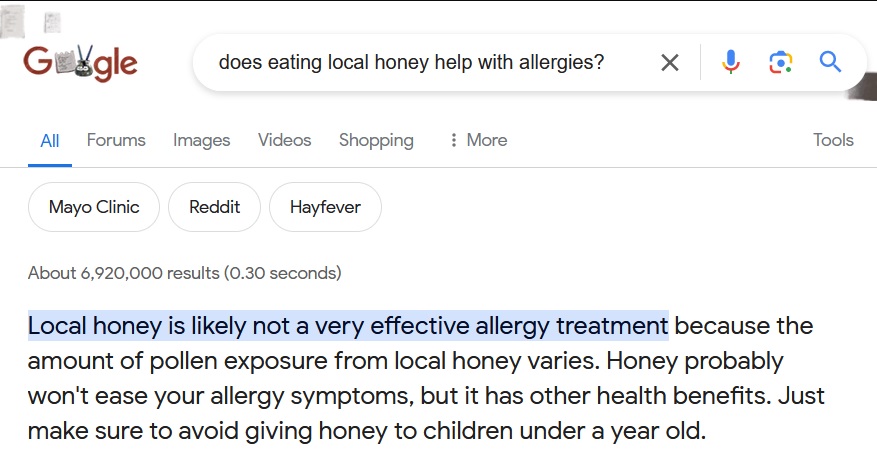
Never mind Google, what does the research say?
What little trust I had for google’s algorithmic “knowledge” is rapidly disappearing as google transforms itself into an advertising board. So I dug deeper1.
I come from an educational background in medicine and epidemiology, so I scoured the internet looking for medical research to support or refute this common folk wisdom. Here’s what I learned.
Study 1: Eating local raw honey does NOT improve seasonal allergies
In 2002 researchers in the U.K. published this article in the Annals of Allergy, Asthma & Immunology. They recruited participants that complained of allergic rhinoconjuctivitis (the medical term for hay fever, literally meaning inflammation of the nose and conjunctiva of the eyes due to allergies) and divided them into 3 treatment groups. Group 1 consumed one tablespoon (~20g) of locally sourced, raw, unfiltered honey every day. The second group consumed a tablespoon of nationally sourced, filtered, pasteurized clover honey daily, while the 3rd group acted as a control group and ate a tablespoon of placebo honey (corn syrup with synthetic honey flavor) each day.
Participants were instructed to keep a daily diary of their symptoms and note when they took their usual allergy medication (participants were instructed to take their regular medication as needed). Neither honey group reported improvements of symptoms compared to the placebo group, leading the researchers to conclude that eating local honey does not reduce the severity of seasonal allergies.
It doesn’t surprise me at all that processed honey would not improve symptoms of hay fever as the processing removes all the pollen that is supposed to desensitize one to hay fever.
This study is often referenced to “debunk the myth that local honey improves seasonal allergies”. Though this study failed to demonstrate that local raw honey improves allergy symptoms, that doesn’t prove that local raw honey doesn’t improve seasonal allergies, at least to some degree or for some people: This small study may not have been big enough, or not conducted meticulously enough to reveal a relatively modest effect of local honey on symptoms of seasonal allergies. There could also be a subset of hay-fever sufferers that do benefit from eating local raw honey but didn’t happen to be included in this small study. This study does provide some evidence that any effect likely isn’t large and universal.
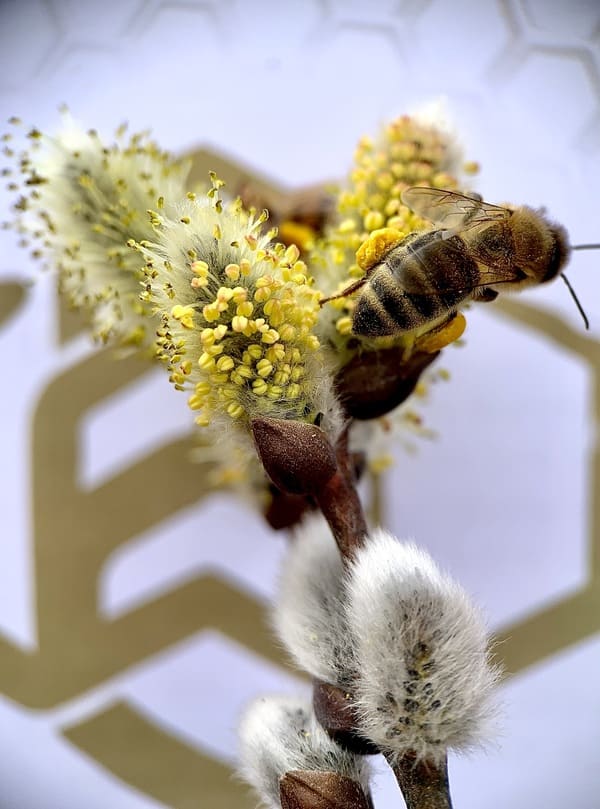
Our award-winning raw honey may not cure your seasonal allergies, but it’s as fresh, healthy, and delicious as anything out there. Get 10% off your next order ![]()
![]() (up to $110 order value) with coupon code: NoAllergies
(up to $110 order value) with coupon code: NoAllergies
Study 2: Eating birch pollen honey DOES improve symptoms of birch pollen allergies
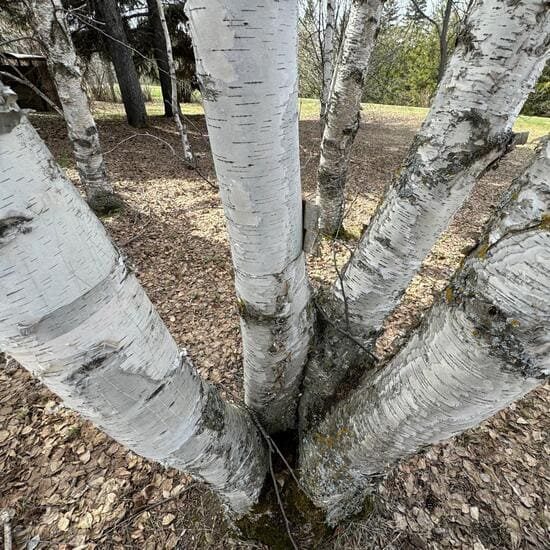
2008-09 research published in the International Archives of Allergy Immunology found that eating honey with birch pollen added to it in addition to taking regular allergy medications during birch pollen season relieved symptoms of allergic rhinoconjunctivitis (a medical term for seasonal/airborne allergies: literally allergic inflammation of the nose and eyes) compared to eating “regular honey” or taking regular allergy medications only. All participants recorded their symptoms and use of allergy medication daily. Both allergy symptoms and the use of allergy medications were reduced in the honey-with-birch-pollen group compared to the allergy-medications-only group.
However, this study is neither here nor there when it comes to local honey treating hay fever since the birch pollen was intentionally added to the honey after the honey was harvested and packaged.
Study 3: Eating local raw honey DOES reduce symptoms of airborne allergies
A 2013 study published in the Annals of Saudi Medicine investigated adding high-dose raw honey (in this case Tualang multifloral honey from Malaysia, where the study took place) to regular treatment in an 8-week study among patients diagnosed with allergic rhinitis. All participants received a 4-week course of antihistamine (loratadine) for their allergic rhinitis with group one also eating 1mg/kg of body weight of raw honey daily while the control group ate a similar amount of placebo (honey-flavored corn syrup). The antihistamine was stopped after 4 weeks but daily consumption of honey/placebo was continued to the end of week 8. At week 4, the end of the antihistamine treatment for both groups, both groups showed improvement in their allergy symptoms compared to the start of the study. However, over the next 4 weeks, only the raw honey group continued to show improvements, while the allergy symptoms in the placebo group worsened. The authors concluded that raw honey added to antihistamines improves overall symptoms of allergic rhinitis. Internet content creators/marketers often quote this study to support their claims that local honey cures hay fever, but it’s not that straightforward.
I noticed that the investigators tested study participants for 5 common household allergens that included house dust mites, cats, wheat flour, peanuts and a fungus (Mucor mucedo), but, interestingly, not to any pollens. I wouldn’t expect to find house dust mites, cats, wheat flour, peanuts, or fungus, even in trace amounts, in the honey I eat. I can guarantee you that our honey contains absolutely none of those allergens.
On a more serious note, the lack of participants with diagnosed allergies to pollen greatly reduces the applicability of this study to people suffering from hay fever (at least in the popular allergen desensitization model). However, the researchers did not attribute the anti-allergy effect of honey to desensitization by exposure to allergens. Rather, they hypothesized that raw honey’s beneficial effects could be due to its selective immunosuppressive effects (specifically on IgE, the immunoglobulin that is involved in allergies like hay fever/allergic rhinitis), and/or raw honey’s well-known anti-inflammatory properties (an allergy is, by definition, an inappropriate inflammatory reaction to an otherwise harmless substance), and possibly with contributions from raw honey’s well-established antioxidant properties.

While this study does support eating raw honey to ameliorate allergic symptoms similar to seasonal allergies, the study participants had allergies to household allergens other than pollen. Not only did this study not include people with airborne pollen allergies, nothing in the authors’ proposed physiology of how the honey reduces allergy symptoms requires that the raw honey be locally sourced.
Of note, the dose of honey used in this study (1 gram of honey per kg of body weight) translates into 3 tablespoons of honey per day for a petite 60kg (132 lb) individual.
Study 4 & 5: Not quite on topic and not reviewed
I found this 2018 study that involved adding a nasal spray of honey to standard treatment of a corticosteroid nasal spray and oral antihistamines for moderate to severe allergic rhinitis. This study found that spraying honey into the nose during allergy season reduced allergy symptoms by acting as a protective barrier inside the nostrils. Nothing to do with eating honey or local honey.
There’s also this 2023 article in the renowned BMJ (British Medical Journal), but access is behind a paywall and somewhat expensive, so I haven’t read it. If anybody has read this article, I’d love to hear what what the article has to say in the comments.
UPDATE: Dr. Jessica Lee, an otorhinolaryngologist (ear, nose and throat (ENT) doctor) who founded Integrative ENT Health commented below that she had read the BMJ review on evidence and that it reached the same conclusions as this post (reassuring! and Thank you, Dr. Lee).
A beekeeping perspective
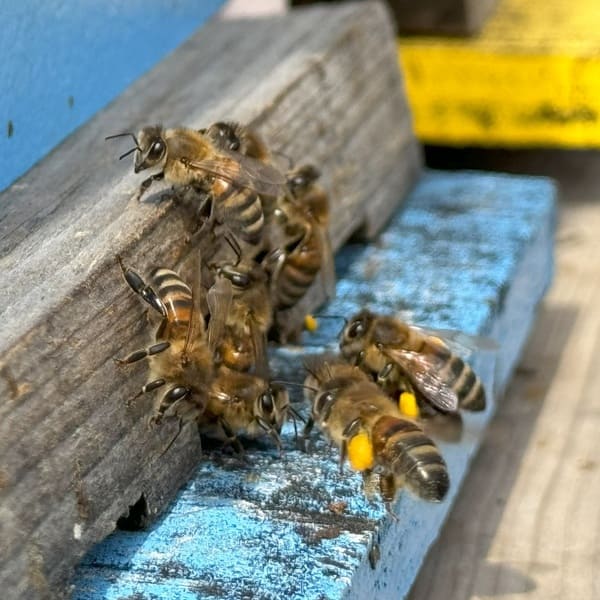
Let’s assume that eating the pollen that causes your allergies does help desensitize you. If you’re consuming the pollen as local raw honey, that specific pollen must be in the honey for the treatment to work. In some cases, like pollination of specific crops like almonds, one can be fairly certain that much of the bee’s honey contains some amount of almond pollen. However, in beekeeping operations like ours in the Canadian prairies, there’s an absolute explosion of different flowers blossoming in our short, but intense summer. Which flowers the bees forage nectar from is almost impossible to predict: bees from any given beehive may be ignoring one field of flowers to forage different flowers in a different area, depending on factors like temperature, wind direction and speed and many others. Pollen analysis studies have shown that labels on jars that claim a certain floral source of the honey are notoriously inaccurate.
Timing is another factor. Where we live, peak airborne pollen season happens before the main honey flow. Furthermore, honey may sit in the hive for several weeks before it’s harvested. Then you may not buy it for several more weeks or months. By the time the honey is in your kitchen, the flowers it came from have likely already stopped blooming. But the bigger reason comes next.
The strongest argument against local honey for seasonal allergies
The strongest argument against eating local raw as a remedy for hay fever is that most people with seasonal allergies are allergic to lighter pollens that remain airborne for long periods. These pollens tend to be from trees and grasses that don’t produce nectar, and reproduce by airborne pollination, rather than by insect pollinators. While the bees may well gather this pollen to feed their young, that is done separately from foraging nectar that’s made into honey. Pollen in raw honey is brought in by bees inadvertently as they forage for nectar from nectar-producing flowering plants that rely on insect pollination. This pollen is heavier than the airborne pollen that causes most seasonal allergies and tends not to remain airborne long, if at all. Also allergies to these heavier pollens are very rare. Therefore the pollen found in raw honey is not the same pollen that causes hay fever. This opinion is shared by allergy experts including the Asthma and Allergy Foundation of America.
So why bother seeking out local raw honey?
I hope that’s not a question you’re asking yourself. Local raw honey is awesome! If you have access to a beekeeper or a farmers’ market where you can buy local raw honey, by all means do so! Whether or not it helps with your seasonal allergies, there are a bunch of other health benefits, solidly backed by a growing body of research, that you will gain from eating raw honey, especially if it reduces your intake of sweets containing processed sugars. Honey from your local producer is much less likely to be adulterated, much more likely to be actually pure and raw, and will likely have a more complex, enjoyable and unique flavor than most, if not all, of the honey found in your local supermarket. Furthermore, raw honey is a very healthy source of energy. Despite the lack of evidence to support eating local raw honey as a remedy for seasonal allergies, there’s no harm in trying it: It might work for you. If you enjoy eating honey anyway, you’ve got nothing to lose.2
Don’t have a hook-up with a local beekeeper? Our Wendell Estate Honey brand was launched for people like you. Order fresh raw honey direct from our farm to your door. Use coupon code NoAllergies for 10% off your next order.
Footnotes
- Of course I did use Google search and Google scholar in my digging. However, I used the medical research databases PubMed and Medline as well, which are independent from Google. Just for fun, I posed the question to ChatGPT, too. It said: “The idea that eating local honey can relieve or reduce symptoms of seasonal allergies, also known as “hay fever,” is a common belief. The theory behind it is that consuming small amounts of local honey, which contains pollen from local flowers, may help desensitize your immune system to these allergens, similar to allergy shots. However, there’s limited scientific evidence to support this claim. Most of the pollen that triggers hay fever symptoms comes from wind-pollinated plants like grasses, trees, and weeds, rather than the types of flowers that bees visit for nectar. Additionally, the pollen found in honey is typically not the same type of pollen that causes allergic reactions in hay fever sufferers. While some people report anecdotal relief from consuming local honey, it’s likely due to a placebo effect rather than any significant reduction in allergy symptoms. For effective management of hay fever, it’s best to consult with a healthcare professional who can recommend evidence-based treatments such as antihistamines, nasal corticosteroids, or allergen immunotherapy.” Not bad.
- The usual honey disclaimers: Honey (raw or pasteurized) shouldn’t be given to infants less than one year of age. If you have diabetes or impaired glucose tolerance, monitor your sugars with honey as you would with any carbohydrate (eating raw honey reduces risk of developing diabetes and is also being investigated as a treatment for diabetes, but it is a carb, so enjoy with that awareness. Full post on diabetes coming soon). Some (very few) people are allergic to honey, so raw honey’s obviously not for them.
Jeremy Wendell
Share this story

4 comments
I have really enjoyed this summary, I love that you take a look at the evidence and are honest about it. I have patients who anecdotally report improved allergy symptoms, but as you mention, raw local honey has many other science backed benefits.
I read the 2023 BMJ article you mentioned. Essentially it is a proposed question (Can ingesting local honey reduce symptoms of allergic rhinitis (hay fever) in children and young people?) followed by a literature review citing the three articles you reviewed above with the conclusion that there is no evidence to support the claim.
Thank you very much for the comments, Dr. Lee. I’m impressed that an ENT specialist surgeon would take the time to read this blog. I’m also grateful that you shared the results from the BMJ article. Evidence is really lacking here.
While your honey may not help my allergies, it is good for my soul.
Thank you very much, Lydia! May any allergies that trouble you be minimal and quickly passing.